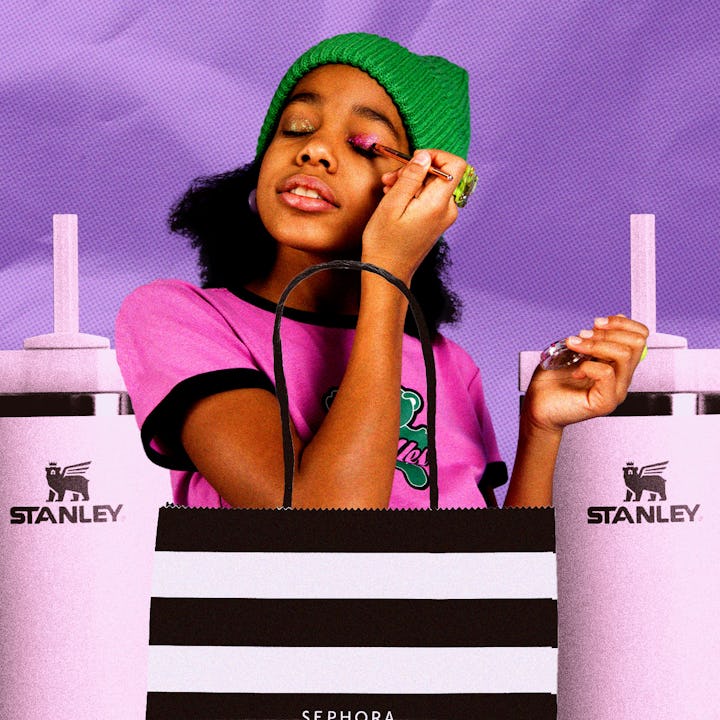Lay Off The Sephora Tweens
Why is everyone OK being mean to young girls?

It seems lately like everyone is gleefully bullying tween girls, who have been made into pop culture’s villains in recent months. From young women on TikTok calling for a ban on tween girls at Sephora to the mountainous heaps of mockery of the Stanley cup trend as big as the cups themselves. Everyone is piling on tween girls, “jokingly” vilifying their love of skin care and accusing them of single handedly fueling our capitalist culture (not an exaggeration). Need I remind all of you adults in positions of power that dumping on these girls is bullying. You are Regina George-ing 11-year-old girls.
It’s not just online, either. I run a podcast about puberty, and lately I’ve noticed a trend in my inbox — stories about aggressive adults berating girls heading home from Taylor Swift concerts or while waiting in line for their Strawberry Açaí Refreshers at Starbucks. Seriously: f-cking stop it.
First off, let’s get something straight: Tween girls are one of the most vulnerable populations in our society with respect to self-esteem and mental health. Research tells us that girls’ self-esteem peaks at age 9 and precipitously declines through the tween and teen years. Yes, age 9! If that wasn’t bad enough, data from 2023 indicates rates of tween girls’ confidence has declined further in recent years, with social media and screen time being pointed to as a major cause. And we know it doesn’t end in tweendom: teen girls are facing a mental health crisis, outstripping boys by 20% in self-reported rates of persistent sadness and hopelessness.
Tween girls, with their developing brains and changing bodies, are bombarded with wave after wave of influencers and pop-up ads telling them what they need to put on their faces and their bodies in order to be worthy of approval. It’s all telling them the same thing: You are not enough. They are told what skincare products to buy for their already flawless, youthful skin so they stay young looking, and what complex layers of make-up to wear so they look older. They’re not at Sephora to annoy adults or make you feel bad about yourself — they’re at Sephora because the culture has told them that’s where they need to be.
There is a drumbeat in their heads:
Spend your hard-earned allowance buying your products and take hours doing your make-up, but make sure you don’t look like you’re wearing make-up. And be sure you don’t look like you try too hard — there’s nothing worse than a “try hard.” Stay natural. But just not that with that big nose or those tiny boobs. Fix those. And take hundreds of pictures doing cool and interesting things, but look chill and post the occasional blurry or ugly shot of you with your eyes closed so you don’t look like you’re flexing AKA showing off.
I don’t know about you, but I don’t let anyone crap on my kid. So what’s a parent to do? Yes, you’re up against some very big societal forces, but we do still have power in steering the course of our young kids’ lives.
Help them become critical consumers. As Rachel Simmons advises, we can’t control what products our girls want, but we can help them develop a critical eye for how companies try to sell them stuff. There have always been trends and coveted new items, and yes social media only exacerbates that, but with our help, kids gain awareness of how they’re being manipulated and can better make choices about what they actually want to purchase. It’s our job as parents to set limits — kids may not like them but they still need them.
Set limits for your kids. Yes, your kid may want the expensive skin care or high-end makeup, but that doesn’t mean you have to spend your hard earned money on those products (particularly if you won’t even spend that money on yourself.) Without judging what they’re pining for (OK you can judge inside your own head, but come on, remember the hideous crap we wanted as kids?) let your kid know that if they want something, they can earn the money to buy it or wait til a birthday.
Be aware of what your kid is watching. If you’ve noticed a trend shift in your house where your kid is asking for new kinds of products or spending much more time on their personal care, it’s time to get curious. In a quiet moment, compare For You pages on TikTok or ask them to show you what they’re watching on YouTube. You might be surprised to see the content they’re consuming. Their feed may have moved from puppies cuddling kittens to now be populated by influencers encouraging them to layer on the make-up. Helping them curate and diversify their social media with other things that interest them, keeping the marketing bombardment at bay (a bit).
What’s all this ultimately about? Protecting tween girls from the derision of the world. They are at a profoundly vulnerable moment of development and we need to push back on the haters and the influencers who are telling them they’re not enough (or they’re too much). Remind them that you love them just as they are. That will earn you an eye roll or a shrug, but they still hear you. Trends will come and go (parachute pants anyone?) but a parent’s unconditional love never goes out of style.
Vanessa is the co-author of the bestselling This Is So Awkward: Modern Puberty Explained, co-host of The Puberty Podcast, and President of Content at Order of Magnitude, the leading brand dedicated to flipping puberty positive.
This article was originally published on